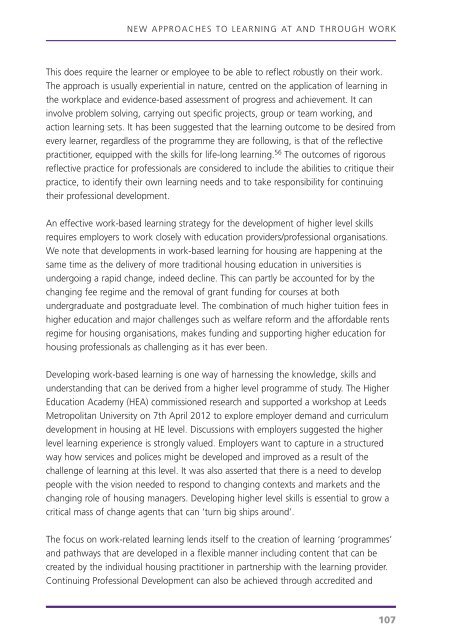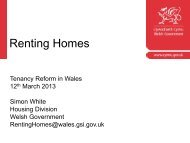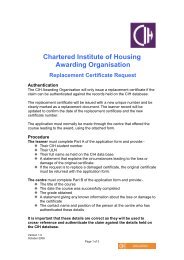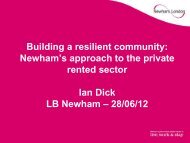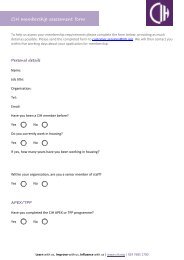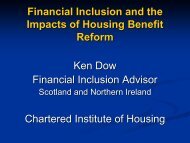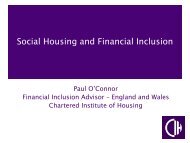View publication - Chartered Institute of Housing
View publication - Chartered Institute of Housing
View publication - Chartered Institute of Housing
You also want an ePaper? Increase the reach of your titles
YUMPU automatically turns print PDFs into web optimized ePapers that Google loves.
NEW APPROACHES TO LEARNING AT AND THROUGH WORK<br />
This does require the learner or employee to be able to reflect robustly on their work.<br />
The approach is usually experiential in nature, centred on the application <strong>of</strong> learning in<br />
the workplace and evidence-based assessment <strong>of</strong> progress and achievement. It can<br />
involve problem solving, carrying out specific projects, group or team working, and<br />
action learning sets. It has been suggested that the learning outcome to be desired from<br />
every learner, regardless <strong>of</strong> the programme they are following, is that <strong>of</strong> the reflective<br />
practitioner, equipped with the skills for life-long learning. 56 The outcomes <strong>of</strong> rigorous<br />
reflective practice for pr<strong>of</strong>essionals are considered to include the abilities to critique their<br />
practice, to identify their own learning needs and to take responsibility for continuing<br />
their pr<strong>of</strong>essional development.<br />
An effective work-based learning strategy for the development <strong>of</strong> higher level skills<br />
requires employers to work closely with education providers/pr<strong>of</strong>essional organisations.<br />
We note that developments in work-based learning for housing are happening at the<br />
same time as the delivery <strong>of</strong> more traditional housing education in universities is<br />
undergoing a rapid change, indeed decline. This can partly be accounted for by the<br />
changing fee regime and the removal <strong>of</strong> grant funding for courses at both<br />
undergraduate and postgraduate level. The combination <strong>of</strong> much higher tuition fees in<br />
higher education and major challenges such as welfare reform and the affordable rents<br />
regime for housing organisations, makes funding and supporting higher education for<br />
housing pr<strong>of</strong>essionals as challenging as it has ever been.<br />
Developing work-based learning is one way <strong>of</strong> harnessing the knowledge, skills and<br />
understanding that can be derived from a higher level programme <strong>of</strong> study. The Higher<br />
Education Academy (HEA) commissioned research and supported a workshop at Leeds<br />
Metropolitan University on 7th April 2012 to explore employer demand and curriculum<br />
development in housing at HE level. Discussions with employers suggested the higher<br />
level learning experience is strongly valued. Employers want to capture in a structured<br />
way how services and polices might be developed and improved as a result <strong>of</strong> the<br />
challenge <strong>of</strong> learning at this level. It was also asserted that there is a need to develop<br />
people with the vision needed to respond to changing contexts and markets and the<br />
changing role <strong>of</strong> housing managers. Developing higher level skills is essential to grow a<br />
critical mass <strong>of</strong> change agents that can ‘turn big ships around’.<br />
The focus on work-related learning lends itself to the creation <strong>of</strong> learning ‘programmes’<br />
and pathways that are developed in a flexible manner including content that can be<br />
created by the individual housing practitioner in partnership with the learning provider.<br />
Continuing Pr<strong>of</strong>essional Development can also be achieved through accredited and<br />
107


